Scholz Disavows Kiev Over Using German Weapons to Attack Russian Territory

German Chancellor Olaf Scholz will insist on refusing to allow Kiev to use long-range weapons received from Germany to attack targets on Russian territory, German newspaper Welt reported on September 14. At the same time, Berlin has continued to ignore Israel’s weapons purchase request since last year.
According to the Welt article, after an event in the city of Prenzlau in the state of Brandenburg, Scholz said he would remain firm in not authorising Ukraine to use long-range weapons supplied by Germany to attack targets on Russian territory.
“That remains the case. That’s why I maintain my position, even if other countries decide otherwise. I won’t do it because I created it as a problem,” Scholz said, as quoted by the newspaper.
In July, Russian President Vladimir Putin warned NATO that Ukrainian attacks with weapons supplied by the alliance against Russian territory meant that the member countries were at war with Russia, stressing that it would change the essence of the conflict since 32 countries of the US-led bloc militarily support Ukraine. Nonetheless, despite Germany’s reluctance, on September 11, US Secretary of State Antony Blinken said he spoke with his Ukrainian counterpart, Andrii Sybiha, and Ukrainian President Volodymyr Zelensky about launching long-range missiles into Russian territory.
Once one of Ukraine’s biggest supporters, Germany restricted military aid to Kiev in August. The decision was taken as an austerity measure due to a lack of funds.
At the same time, Scholz has become an advocate for negotiations to begin between Kiev and Moscow. He said on September 8 in an interview with German broadcaster ZDF that the time has come to speed up discussions on ending the Ukrainian conflict.
“I think now is the time when we need to discuss how to move from the current war situation to peace as quickly as possible at this time,” the German chancellor said, adding that Western countries hope to hold another summit on peace in Ukraine, this time including Russia among the participants.
In the interview, Scholz also addressed the Nord Stream gas pipeline explosion, saying that the causes “must be investigated, and those involved must be held accountable.”
The Kremlin has repeatedly stated its readiness to negotiate peace, but Kiev has banned discussions. In June, Russian President Vladimir Putin put forward Russia’s proposal for a peaceful resolution of the conflict in Ukraine: Moscow would immediately cease fire and declare its readiness for negotiations after the withdrawal of Ukrainian troops from the territory of Russia’s new regions – Donetsk, Kherson, Lugansk and Zaporozhye.
In addition, Putin said that Kiev should renounce its intentions to join NATO, carry out demilitarisation and denazification, and accept a neutral, non-aligned, and nuclear-free status. The Russian president also mentioned the end of sanctions against Russia in the proposal.
Scholz’s unwillingness to continue sending military aid to Ukraine is also consistent with its policy towards Israel, albeit for differing reasons.
Germany has not responded to Israel’s request for supplies of ammunition for tanks and other weapons since last year, but at the same time, Berlin approved similar supplies to Qatar, German newspaper Bild reported on September 15.
Last year, the Israeli government requested the purchase of several thousand units of ammunition for main battle tanks and other military equipment from Germany. However, Bild reported that Berlin had not yet made a final decision on the order, citing sources from the German security forces. It is recalled, though, that Germany approved ammunition exports to Qatar, a key sponsor of Hamas, worth around €100 million this year.
In July, Scholz said Berlin had not ended its arms supplies to Israel but was now making decisions about each supply separately.
“For the Jewish state, which is currently fighting on several fronts against the terrorist groups Hamas and Hezbollah, the purchase of certain military equipment from abroad is particularly important,” wrote Bild journalist Björn Stritzel.
Shortly after the Hamas attack on Israel on October 7, Scholz visited Israel and delivered a pledge of unconditional solidarity with the country. “In difficult times, Germany has only one place, and that is by Israel’s side,” he said, adding, “Germany supports the security of Israel and its citizens.”
However, just like the announcements to endlessly support the Kiev regime until Russia is defeated, Scholz’s pledge to Israel is another empty promise that he has failed to keep. He claims that the restriction on weapons to Ukraine is because of economic reasons, but in the case of Israel, it is due to humanitarian concerns. Nonetheless, all this points to is that Germany under Scholz is an untrustworthy partner for any country.
*
Click the share button below to email/forward this article to your friends and colleagues. Follow us on Instagram and Twitter and subscribe to our Telegram Channel. Feel free to repost and share widely Global Research articles.
Get Your Free Copy of “Towards a World War III Scenario: The Dangers of Nuclear War”!
This article was originally published on InfoBrics.
Ahmed Adel is a Cairo-based geopolitics and political economy researcher. He is a regular contributor to Global Research.
Featured image: Olaf Scholz, federal chancellor of Germany, meets Volodymyr Zelenskyy, president of Ukraine, in Kiev, Feb. 14, 2022. (President of Ukraine)

